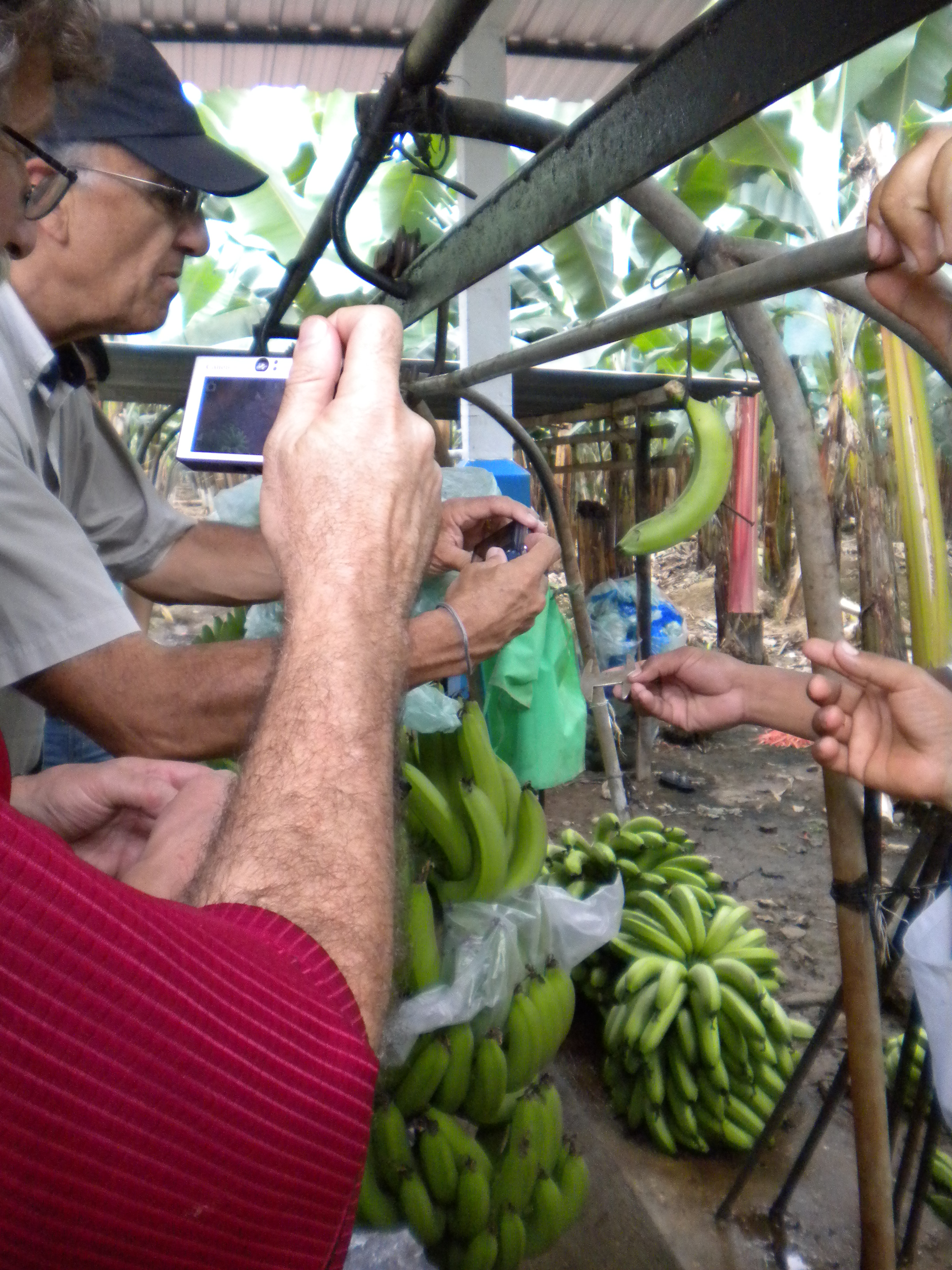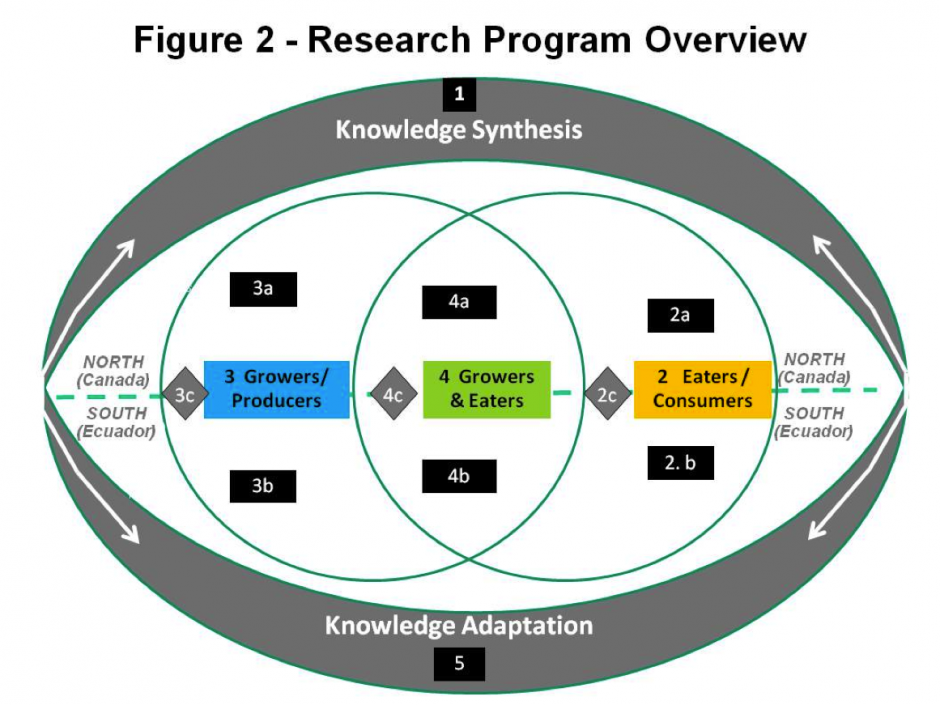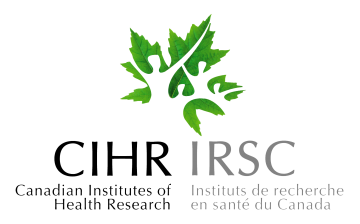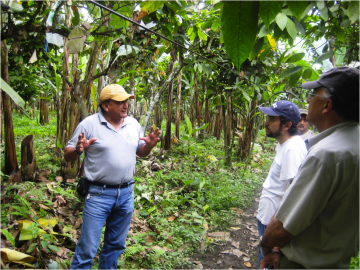
Member of an organic banana small producer cooperative knowledge user group partner explaining to Ecuadorian and Canadian research team members how agro-ecological principles can be applied to banana production.
Dates:
2011-2017
Funded by:
Canadian Institutes of Health Research (CIHR)
Partner Organizations:
In Canada
Simon Fraser University (SFU)
University of Northern British Columbia (UNBC)
University of Toronto (UT)
University of Ottawa (UO)
Provincial Health Services Authority (PHSA)
Vancouver Coastal Health (VCH)
Northern Health (NH)
Food and Commercial Workers of Canada (FCAW)
Think and Eat Green at Schools (TEGS)
In Ecuador
University of Andina Simon Bolivar (UASB)
MSP: Ministerio de Salud Pública [Ministry of Public Health]
MIES: Ministerio de Inclusión Económica y Social [Ministry of Economic & Social Inclusion]
MAGAP: Ministerio de Agricultura, Ganadería, Acuacultura y Pesca [Ministry of Agriculture]
SIPAE: El Sistema de Investigación sobre la Problemática Agraria [Ecuadorian Agrarian Research System]
UROCAL: Unión Regional de Organizaciones Campesinas del Litoral
COPEMPBAL: Coordinadora de Pequeños y Medianos Productores de Banano del Litoral
CODEMIA: Consorcio de Desarrollo de Manejo del Agua y Ambiente
FENOCIN: Federación Nacional de Organizaciones Campesinas e Indígenas e negras [Federation of Indigenous Afro-Ecuadorians and Peasants]
PROGRAM PROFILE
A five year interdisciplinary program of research funded by CIHR, the TEG3 program of research addresses the health effects of the global food system through five interconnected projects areas in Ecuador and Canada. It builds on a long history of collaboration between researchers in the two countries that is reinforced by a Memorandum of Understanding between UBC and UASB. The TEG3 Research Program objectives are to:
Deepen understanding of pathways to health and health equity associated with global food systems; and strengthen capacities for implementing effective (coherent) interventions.
This program of research ranges from the effects of pesticide exposure on banana workers in Ecuador and blueberry pickers in British Columbia’s Fraser Valley, through healthy eating in schools in Vancouver and Quito and other Ecuadorian cities, to changing livelihoods among indigenous communities in the Andes and in rural Canada. It is based on enabling people without a voice in how food is produced, marketed and consumed, to engage in making decisions that will allow safer working conditions, healthier eating practices, and preservation of cultural practices based on environmental resources.
By combining the results of existing knowledge on food systems and health with new knowledge generated in Ecuador and Canada, this program will move from knowledge to action using information and communication technologies like photography, teleconferencing and web-based meetings to connect the people who grow and eat food with each other, and with decision-makers in government and non-governmental organizations. Ultimately, this will result in policies and programs that will protect health in a coherent way that makes sense in both the North, and the South.
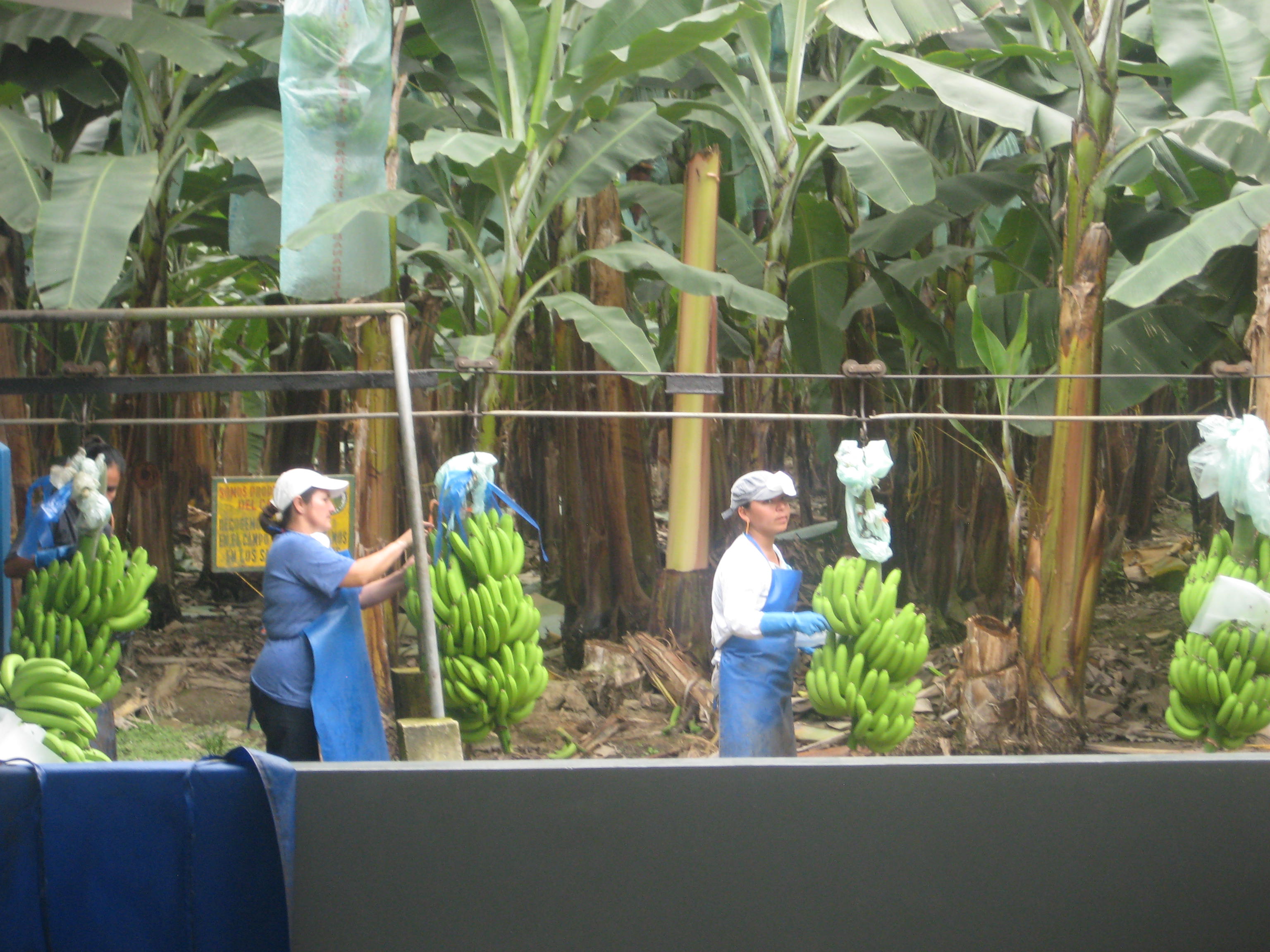 |
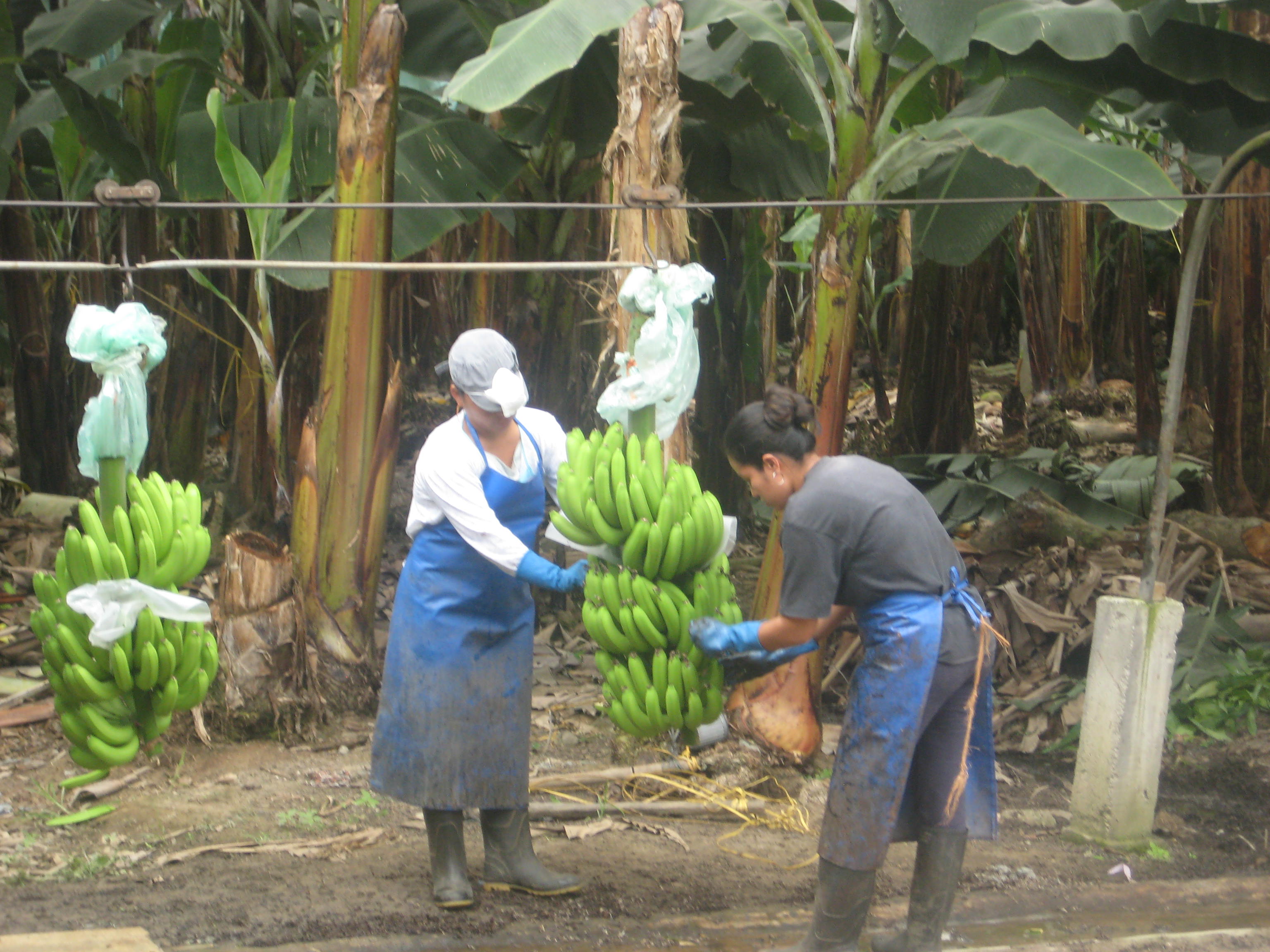 |
Program Organization
The inclusion of the 5 projects shown in Figure 2 is essential for the coherence of the whole TEG3 research program. Each plays an important role in informing other projects within the research program; and each is informed by the others. Each project contains various studies, with extensive potential for sub-studies.
The initial studies within each project are introduced below (numbered by the order in which each will be started).
Research areas
KNOWLEDGE SYNTHESIS: What do we know- and how can we improve and operationalize this?
Research Questions
1.1. How does the global food system affect health and health equity, directly and indirectly?
1.2. What is known about the effectiveness of related interventions to promote health equity?
Description
To comprehensively characterize current knowledge regarding how food systems affect health equity, Jerry Spiegel and Hannah Wittman (English language) and Jaime Breilh (Spanish language) are leading teams of student researchers and project co-investigators in systematically reviewing literature on food security, food sovereignty and health equity to analyze how focus varies in different settings, sectors and disciplines according to conceptualized pathways. This analysis is being reviewed in workshops with knowledge users to identify gaps in knowledge; and by applying a transdisciplinary and intercultural approach, to identify interventions and further research that can be pursued, including by the TEG3 program. Substudies are being led by TEG3 investigators on specific topics, such as Tim Takaro’s examination of impacts of climate change on health equity, so that these insights can be pursued further in other TEG3 field studies.
Project 1.1. Meta-narrative synthesis to critically review existing knowledge
...at the "consumer" (or eater/ "food citizen") level
Research questions
2.1. What issues related to health impacts and health equity should be incorporated into food-related curricula on food system sustainability and institutional adaptations to climate change;
2.2. What policy is needed to ensure that good nutrition and support healthy food production locally and abroad, contributes to increases food security as well as decrease institutions’ contributions to climate change;
2.3. How is the health of local producers taken into account in the creation of food policy and practices that promote a sustainable regional food system; and,
2.4. How does practice reinforce the learning of university students, high school students, professionals, and other citizens regarding knowledge of the relationships between food security, sustainability, climate change and human health.
Description
To examine how healthy food choice and sustainable food system interactions can be reinforced by establishing supportive institutional practices and policies, Jaime Breilh and Hannah Wittman are leading an initiative to extend the approach pioneered by the Think and Eat Green @ Schools in Vancouver to Ecuadorian settings, through a school lunch program linked to local producers employing agro-ecological practices and supplemented by curriculum changes in line with this. Once underway in Ecuador, our intention is to then conduct comparative analysis in Canadian and Ecuadorian settings to consider the possibilities for generalizing such interventions. This study is being supplemented by sub-studies on health food choice in different settings as well as on awareness, perceptions and exposure to contaminants in current diets, with the assistance of Laurie Chan.
Project 2.1:Promoting health equity in schools: Attitudes and practices regarding food
... at the producer (or "grower") level
Research questions
3.1 How do food production practices affect health (equity) – in Ecuador?
3.2 How do food production practices affect health (equity) – in British Columbia? and
3.3 How can these pathways be monitored and mitigated from global to workplace level?
Description
To examine how different approaches to producing food for the global food system affect health equity, case study examinations of the leading agricultural export commodities are being conducted in each study jurisdiction. Anne-Marie Nicol and Hannah Wittman are leading an investigation of effects of blueberry production on workers and communities in BC’s Fraser Valley, while Jaime Breilh and Jerry Spiegel pursue a comparable study of banana production in Ecuador. Particular attention is being given to pesticide and agrotoxic use, through the involvement of Annalee Yassi and Ramiro Ramino. The first study being undertaken is an economic evaluation of the costs and consequences of alternative approaches to banana production, comparing agro-ecological with agro-industrial methods, with the intention to then adapt the research methodology to blueberry production.
Project 3.1. Health impacts associated with food production
... in indigenous "grower/gatherer and eater" settings
Research questions
4.1 What are the health consequences of changing” food cultures” in rural, remote and indigenous populations, both men and women?
4.2 What governance processes can best support effective addressing of food system changes?
Description
To examine how global food system displacement of sovereignty affects health equity in populations that have retained cultural identities closely linked to the growing/gathering and eating of food, we are working with indigenous communities in Ecuador and BC. Jaime Breilh is leading in work with Andean and Amazonian communities and their organizations that are involved in Project Area 2, while Margot Parkes will be developing relationships with BC aboriginal communities in the last phase of the TEG3 project to stimulate North-South exploration of effects on sovereignty of food choice and adaptive strategies to the hegemony of global food systems.
Project 4.1. Food security and food sovereignty in rural, remote and indigenous communities
Application of knowledge
Research questions
5.1 What should the objectives of a health-equity KT strategy be if it is to be informed by comprehensively summarized academic and non-academic knowledges; by the perspectives of policymakers in relevant government and non-governmental bodies; and by the priorities and perspectives of vulnerable populations within the global food system?
5.2 What indicators are appropriate for evaluating the success of a participatory KT intervention linking marginalized stakeholders and policymakers across different components of the global food system?
5.3 How have the tools created by this project performed with respect to the indicators?
5.4 How were separate action research projects affected by their linkages with each other through use of an open-source software platform?
Description
Taking advantage of our international interdisciplinary and intercultural team, Andrea Cortinois is leading a study of how innovative information and communication technologies can support effective knowledge translation.
Project 5.1. Knowledge translation and the scholarship thereof
